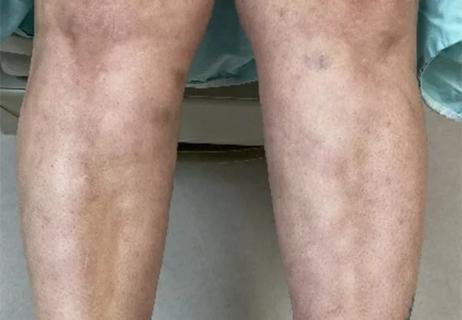Risk does not end after the acute phase is over.

A Cleveland Clinic study found that survivors of COVID-19 with moderate or severe obesity have an increased risk of long-term complications of the disease, compared with patients who do not have obesity.
Advertisement
Cleveland Clinic is a non-profit academic medical center. Advertising on our site helps support our mission. We do not endorse non-Cleveland Clinic products or services. Policy
“Multiple studies have identified obesity as a major risk factor for the development of severe COVID-19, which is characterized by hospital admission, intensive care and ventilator support.. To our knowledge, this is the first study to suggest patients with obesity also are at increased risk for complications that last well beyond the acute phase,” says Ali Aminian, MD, director of Cleveland Clinic’s Bariatric & Metabolic Institute and first author of the study published online June 1 in Diabetes, Obesity and Metabolism.
In this observational study, the researchers tapped a registry of patients within the Cleveland Clinic Health System who tested positive for SARS-CoV-2 infection between March 2020 and July 2020, with follow-up until January 2021.
They examined three indicators of possible long-term complications of COVID-19—hospital admission, mortality and the need for diagnostic testing—that occurred a minimum of 30 days after the first positive test for SARS-CoV-2. The outcomes were compared among five groups of patients based on their body mass index (BMI): 18.5-24.9 (normal), 25.0-29.9 (overweight), 30.0-34.9 (mild obesity), 35.0-39.9 (moderate obesity) and 40 or greater (severe obesity).
The final cohort included 2,839 patients who survived the acute phase of COVID-19 and did not require ICU admission. During a 10-month follow-up, 1,255 patients (44%) required hospital admission, 1,230 (43%) required diagnostic testing and 29 (1%) died.
Compared with patients with normal BMI, the risk of hospital admission was 38% higher in patients with moderate obesity and 30% higher in patients with severe obesity.
Advertisement
Additionally, the need for diagnostic tests to assess different medical problems was 25% and 39% higher in patients with moderate and severe obesity, respectively. Specifically, the need for tests to diagnose cardiac, pulmonary, vascular, renal, digestive and mental health problems was significantly higher in patients with a BMI or 35 or greater, compared with normal BMI patients.
Obesity is a complex disease associated with increased risk for cardiovascular disease, blood clots and lung conditions. It is known to weaken the immune system and create a chronic inflammatory state. These conditions are likely responsible for poor outcomes following SARS-CoV-2 infection.
“The observations of this study possibly may be explained by the underlying mechanisms at work in patients with obesity, such as hyper-inflammation, immune dysfunction and comorbidities,” says Bartolome Burguera, MD, PhD, Chair of Cleveland Clinic’s Endocrinology & Metabolism Institute and coauthor of the study. “Those conditions are known to lead to poor outcomes in the acute phase of COVID-19 in patients with obesity and could possibly lead to an increased risk of long-term complications of COVID-19, as well.”
In the next phase, the researchers plan to confirm that obesity is a major risk factor for the development of post-acute sequelae of SARS-CoV-2 infection and determine the long-term follow-up protocol needed by patients with obesity following infection with this virus.
Advertisement
Advertisement

Patients report improved sense of smell and taste

Clinicians who are accustomed to uncertainty can do well by patients

Unique skin changes can occur after infection or vaccine

Cleveland Clinic analysis suggests that obtaining care for the virus might reveal a previously undiagnosed condition

As the pandemic evolves, rheumatologists must continue to be mindful of most vulnerable patients

Early results suggest positive outcomes from COVID-19 PrEP treatment

Could the virus have caused the condition or triggered previously undiagnosed disease?

Five categories of cutaneous abnormalities are associated with COVID-19